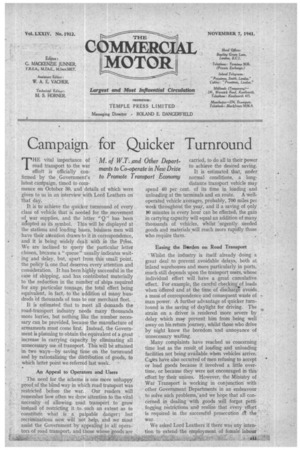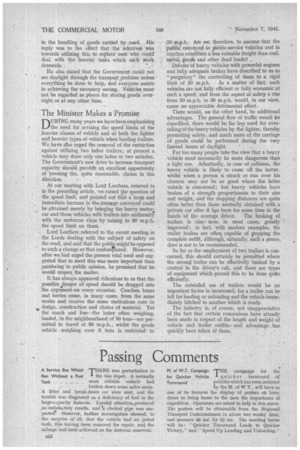Campaign. for Quicker Turnround
Page 13

Page 14

If you've noticed an error in this article please click here to report it so we can fix it.
M. of W .T . find Other Departments to Co-operate in New Drive to Promote Transport Economy THE vital importance of road transport to the war effort is officially confirmed by the , Government's latest carnpaign, timed to commence on October 30, and details of which were given to us in an interview With Lord Leathers on that day. '
It is to achieve the quicker tumround of every class of vehicle that is needed for the movement of war supplies, and the letter "Q" has been a:cropted as its symbol. This will be displayed at the stations and loading bases, business men will have their attention drawn, to it in correspondence, and it is being widely dealt with in the Prtss. We are inclined to query the particular letter chosen, because a "queue" usually indicates waiting and delay, but, apart from this small point, the policy is one that deserves every attention and consideration. It has been highly successful in the case of shipping, and has contributed materially to the reduction in the number of -ships required for any particular tonnage, the total effect being equivalent, in fact-to the addition of many hundreds 'of thousands of tons to our merchant fleet.
It is estimated that to meet all demands the road-transport industry needs many thousands more lorries, but nothing like the number necessary can be provided, because the manufacture of armaments must come 'first. Instead, the Governmerit is planning to obtain the equivalent of a great increase in carrying capacity by eliminating all unnecessary use Of transport. This will be attained in two ways—by saving time cm the turnround and by rationalizing the distribution of goods, to which latter point we 'referred last week.
An Appeal to Operators and Users The need for the scheme is one more unhappy proof of the blind way in which road transport was restricted before the war. Our readers will remember how often we drew attention to the vital necessity of allowing, road transport to grow instead of restricting it to such an extent as to constitute what is a palpable danger ; but recriminations now will not help, and .we must assist the Government by appealing to all operators of road transport, and those whoseoods are.
•
carried, to do all in their power to achieve the desired saving.
It is estimated that, under normal conditions, a longdistance transport vehicle may spend 40 per cent, of its time in loading and unloading at the terminals and en route. A welloperated vehicle averages, probably, 700 miles per week throughout the year, and if a saving of only 11) minutes in every hour' can be effected; he gain in carrying capacity will equal an addition of many thousands of vehicles, witilst :urgently needed goods and materials,will reach more rapidly those who requ-ire them: Easing the Borden on Road Transport ' Whilst the industry' is itself already doing a great deal to prevent avoidable delays, both at inland warehouses and more particularly in ports, much still depends upon the transport users, whose individual effort will have a great. cumulative effect. For example, the careful checking of loads when Offered and at the time of discharge avoids, a mass of correspondence and consequent waste of man power. A further advantage of quicker turnlound is the saving of daylight for driving. The strain on a driver is rendered more severe by delay which may prevent him from .being well ' away on his return journey, whilst those who drive by night know the boredom and annoyance of unnecessary waiting.
Many complaints have reached us concerning time lost as the result, of loading and unloading facilities not being available when vehicles arrive. CaSts have also occurred of men refusing to accept or load goods because it involved a little overtime, or because they were not encouraged in this effort by their unions. However, the Ministry of War Transport is working in conjunction with other Government Departments in an endeavour to solve such problems, and we hope that all concerned in dealing with goods will forget pettifogging restrictions and realize that every effort is required in the successful prosecution di the war. .
We asked Lord Leathers if there was any inten tion to extend the emplo merit of female labour , in the haradling of goods carried by road. His reply was to the effect that the intention was towards utilizing this to replacemen who could deal with the heavier tasks . which such work demands..
He also stated that the Government could not see daylight through the transport problem unless everything be done to help, 4'nd everyone assists in achieving the necessary saving, Vehicles must not be regarded as places for storing goods overnight or at any other time.
The Minister Makes a Promise
DURING many years we have been emphasizing Lithe need for revising the speed limits of the heavier classes of vehicle and of both the lighter and heavier types of vehicle when hauling trailers. We have also urged the removal of the restriction against utilizing. two laden trailers ; at present a vehicle may draw only one laden or two unladen. The Government's new drive to increase transport capacity should provide an excellent opportunity of pressing the, quite reasonable, claims in this direction.
At our meeting with Lord Leathers, referred to in the preceding article, we raised he question of the speed limit, and pointed out that a large and immediate increase in the tonnage conveyed could be obtained merely by bringing the heavy motor.; car and those vehicles with trailers into uniformity with the motorcar class by raising to 30 m.p.h. the speed limit on them.
• Lord Leathers referred to the recent meeting in • the Lords dealing with the subject of safety on the road, and said that the public might be opposed to such a change as that contemrilated. However, after we had urged the present vital need and suggested that to meet this was more important than pandering to public opinion, he promised that he would reopen the matter.
It has always appeared ridiculous to us that the possible .clanger of speed should be dragged into ,the .argument-on every occasion. Coaches, buses and lorries come, in many cases, from the same works and receive the same meticulous care in • design, construction and choice of material. Yet tho coach and bus—the latter often weighing, loaded, in the neighbourhood of 1.0 tons—are permitted to travel at 30 m.p.h., whilst the goods vehicle weighing over 3. tons is restricted to 20 m.p.h. Are we, therefore, to assume that the public conveyed in public-service vehicles and in coaches constitute a less valuable freight than coal, metal, goods and other dead loads?
Drivers of heavy vehicles with powerful engines and fully adequate brakes have described to us as "purgatory" the controlling of these to a rigid limit of 20 m.p.h. As a matter of fact, such vehicles are not fully efficient or fully economic at such a speed, and from the aspect of safety a rise from 20 m.p.h. to 30 m.p.h. would, in our view, cause no appreciable detrimental effect.
There would, on the other hand, be additional advantages. The general flow of traffic would be expedited, there would be far less need for overtaking of the heavy vehicles by the lighter, thereby promoting safety, and much more of the carriage of goods could be performed during the very limited hours of daylight.
Far too many people take the view that a heavy vehicle must necessarily be more dangerous than a light one. Admittedly, in case of _collision, the heavy vehicle is likely to come off the better, whilst when a person is struck or run over his chances may not be so good where the latter vehicle is concerned ; but heavy vehicles. have brakes of a strength proportionate to their sizeand weight, and the stopping distances are quite often better than those normally obtained with a private car after it has been for some time in the hands of the average driver. The braking of trailers is also now, in most cases, greatly improved ; in fact, with modern examples, the trailer brakes are often, capable of topping the complete outfit, although, naturally, such a procel dure is not to be recommended.
So far as the employment of two trailers is con, cerned, this should certainly be permitted where the second trailer can be effectively braked by a control in the driver's cab, and there are types of equipment which. permit this to be done quite efficiently.
The extended use of trailers would be an important factor in turnround, for a trailer can be left for loading or unloading and the vehicle immediately hitched to another which is ready.
The industry is, of course, not unappreciative of the fact that certain concessions have already been made in respect of the length and weight of vehicle and trailer outfits,– and advantage, has quickly been taken of these.




















































